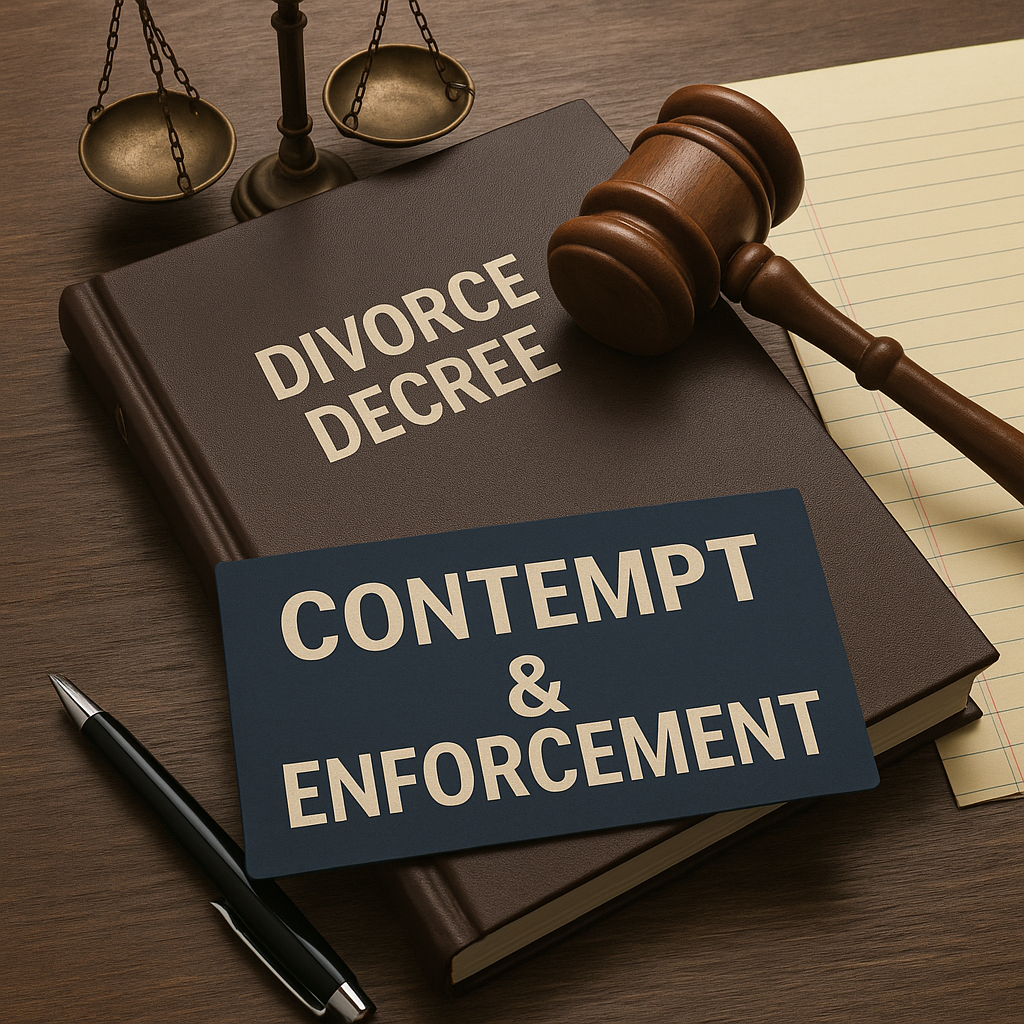How Do I Enforce a Utah Divorce Decree (Contempt & Motions to Enforce)?
Plain-English guide to contempt, motions to enforce, support collection, parent-time, property transfers, timelines, and attorney fees
When your ex ignores the court’s orders, you do not have to start over. Utah law gives you tools to enforce your divorce decree from unpaid support to missed parent-time and property transfers. Understanding how to use contempt motions and other enforcement options can help you protect your rights without reopening your entire case.
Utah Law Explained breaks this process down into real-world steps so you know what works, when to use it, and what proof matters most.
Your Ex Stops Paying Child Support or Alimony
Outcome. You can file a motion to enforce or a motion for order to show cause in the same divorce case. Utah courts treat support orders seriously, and judges can order wage garnishment, intercept tax refunds, or impose jail time for willful nonpayment.
What to show. The amount owed, dates missed, and prior efforts to collect. If you have payment records or communication logs, attach them to your motion.
Property or Asset Transfers Never Happened
Outcome. If your decree awarded you property such as a vehicle title, house deed, or retirement share and your ex refuses to comply, you can file a motion to enforce property division. The court can compel signature transfers or issue alternative orders to complete the transaction.
If contempt is found, judges may add fines or attorney-fee reimbursement to compensate you for the delay.
Parent-Time Orders Are Ignored
Outcome. When a parent blocks scheduled visits or custody exchanges, a motion for order to show cause can enforce parent-time. Utah courts may require make-up time, counseling, or supervised exchanges to restore compliance.
Contempt findings here often depend on proof that the violation was intentional, so keep messages, calendars, or police reports if exchanges were refused.
Unsure Whether to Enforce or Modify
Outcome. If circumstances have changed like a new job, relocation, or a medical condition, a motion to modify may be more appropriate than enforcement. Enforcing an outdated order can backfire if the other side shows substantial changes since it was issued.
The key is to decide whether you are trying to fix disobedience or change the terms.
Can You Get Attorney Fees Covered?
Outcome. Utah judges may award attorney fees in enforcement cases when one party’s violation caused unnecessary legal costs. In contempt motions, you can request reimbursement for your lawyer’s time and filing expenses if you prove the violation was willful.
Timelines and What to Expect
Outcome. After you file a motion or contempt petition, the court sets a hearing date, usually within a few weeks. Both parties attend, and the judge decides if a violation occurred and what remedies apply.
Sanctions can include wage withholding, fines, probation, or short jail sentences for ongoing defiance. Most cases resolve through compliance once the violating party sees the court taking action.
Video & Social Learning Hub
YouTube: Enforcing a Divorce Decree
Instagram: Quick Reels on Utah Enforcement
Need Help Enforcing Your Decree?
If your ex is not following the terms of your Utah divorce decree, do not assume nothing can be done. Courts expect both sides to comply, and enforcement tools exist to make that happen. Whether through contempt, wage withholding, or a show-cause motion, you have clear options to restore fairness and stability.
Talk to a Utah AttorneyFor more plain-English legal guidance, stay updated with Utah Law Explained, explore our mission on the About Us page, or connect with trusted counsel like Gibb Law Firm.
